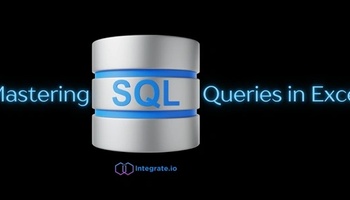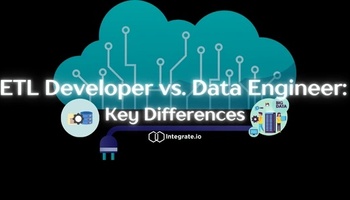- Data Governance Will Require Increasing Technical Expertise
- Data Governance Will Adapt to Meet Each Organization's Needs
- Data Governance Will Improve Customer Experience
- Data Governance Will Change Data Storage
- Data Governance Will Emphasize Compliance and Security
- Data Governance Will Increase the Use of Actionable Data
- Data Governance Will Incorporate More ML and AI
- Data Governance Will Include Automated Data Integration
- Data Governance Will Increasingly Rely on Data Lakes
- Data Governance will Continue to Grow Rapidly
- How Integrate.io Can Help
According to TechTarget, data governance is managing the integrity, security, availability, and usability of data in an organization's system. Effective and efficient data governance makes sure data is accurate and consistent. There are several predictions regarding data governance you need to know.
1. Data Governance Will Require Increasing Technical Expertise
Companies will probably see a growing need for data officers and data scientists. Companies need data specialists to understand and maneuver the technical landscape that is big data. There is already a growing gap between the need for IT specialists and the availability of qualified personnel. A few of the specific skills that data management will demand include data analytics, security skills, artificial intelligence expertise, and enterprise architecture. Your company will need to bring in experts who can connect your data sources and provide easy migrations to the cloud while still connecting to on-premise legacy systems.
2. Data Governance Will Adapt to Meet Each Organization's Needs
It's imperative to handle data so that it works for your company's specific goals and business outcomes. Whether it is production, accounting, or any other type of business, customization is key to effectively using and managing data. One way to customize data is to decide which employees have access to which information. A company needs a system in place that makes it possible for employees with certain clearance to easily access data while keeping it out of the hands of those who do not need it.
3. Data Governance Will Improve Customer Experience
One of the primary uses of data is to attract, convert, and maintain customers. Your use of data will determine the convenience, consistency, and speed of your customer's interactions. This leads to loyal customers. Data analytics are the driving force behind improving each customer's unique experience. Data governance must also maintain the critical balance between using data to understand and connect with customers while still using the data ethically and maintaining customer privacy. You will need to implement specific management tools and governance policies to reach these goals.
4. Data Governance Will Change Data Storage
Warehouse for data storage will not disappear, but they will likely change. The transition to cloud storage will continue to evolve and move into the arena of self-service. ComputerWeekly points out that software-defined storage will deliver data services that are available in both virtual machines and flexible containers. Providing seamless mobility of data and offering tools that enable users to keep their data in a single place and under their control will drive performance while keeping costs down.
5. Data Governance Will Emphasize Compliance and Security
Keeping data secure and compliant is an ongoing priority that will only become more crucial in the future. Every organization will need to implement a detailed plan to continually monitor and safeguard data. There must also be a plan in place to quickly and effectively deal with any type of data breach that may occur. This would include assigning responsibility throughout an organization for protecting data and providing several levels of controls and safeguards for different types of data.
6. Data Governance Will Increase the Use of Actionable Data
Actionable data is data that provides enough information or insight so leadership can take action and make clear decisions regarding that data. This process starts when unstructured data becomes structured and ultimately actionable. You'll need to get a handle on that process so the increasing amounts of data your company manages can quickly and efficiently transform into actionable data. Most organizations will need the expertise of an experienced IT company to make that happen as effectively as possible.
7. Data Governance Will Incorporate more ML and AI
Artificial intelligence and machine learning will play a greater role in how you store and use data. AI is already completing complex integration activities such as mapping. This will continue, and you will likely see AI assisting less and augmenting more by actually taking on human tasks. As both AI and ML advance and become more complex, they will complete many routine tasks. These tasks will become invisible as we advance toward autonomous integration. You will see increasing hyper-automation in almost every area of business.
8. Data Governance Will Include Automated Data Integration
Handling an ever-increasing amount of data is something nearly every organization needs to prepare for. Companies are now measuring data in zettabytes. A zettabyte is the equivalent of a trillion gigabytes. It will become necessary to use automation to efficiently organize and use this amount of data. While total automated data integration is not happening yet, it will likely involve engineering and analytical tools to bring this to fruition.
9. Data Governance Will Increasingly Rely on Data Lakes
Data warehouses consist of filtered, structured data while a data lake is an extensive pool of primarily raw data. Data warehouses will continue to support a variety of business activities, but you will see increasing reliance on data lakes. Data lakes can more effectively support artificial intelligence and basic analytics. Data lakes are often more scalable and inexpensive to use. Implementations and cloud migrations with lake data are becoming increasingly easy and fast with SaaS platforms.
10. Data Governance Will Continue to Rapidly Grow
The data market will grow dramatically during the next several years. According to BusinessWire, the market for data governance will likely grow over 5.2 billion dollars by 2026. The database market will expand, giving organizations more options when deciding what is best for their specific type of business. The increase in compliance mandates and regulations will also cause the data governance market to grow.
How Integrate.io Can Help
Data governance is complex and continually developing. You need the expertise of data and IT professionals to help you manage, store, and effectively use your data in ways that support your company's goals. Integrate.io provides a platform that will allow you to integrate, prepare, and process data for cloud analytics. With a scalable platform, each business can easily and effectively make the most of big data without investing in extra personnel, new hardware, or software. Contact Integrate.io for a 14-day trial.









